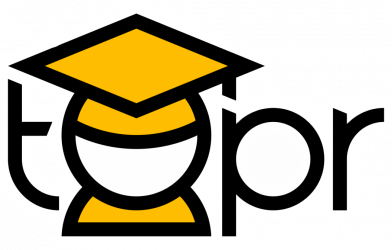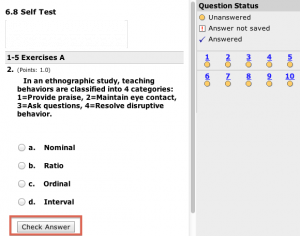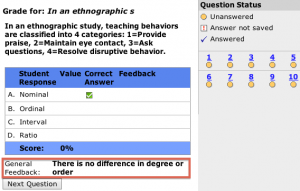Tags: Assessment, Quizzes, Self-Test
Description
Self‐assessment can play a central role in learning, revisions and review (Andreade & Du, 2007; Weimer, 2010). The self‐assessment process involves a complex process of internalization and self‐regulation, and with implications for research and practice. “Researchers see criteria‐referenced self‐assessment as a key component of self‐regulation with the potential to scaffold other components, including goal‐setting, planning and self‐reaction. The research findings suggest that students had positive attitudes toward self‐assessment after extended practice; felt they can effectively self‐assess when they know their teacher’s expectations; claimed to use self‐assessment to check their work and guide revision; and believed the benefits of self‐assessment include improvements in grades, quality of work, motivation and learning. (Andreade & Du 2007)” In online courses, instructors can use self-tests as a way to facilitate students’ learning, such as help them understand complex concepts and procedures.
Clarke (2012) presented a study regarding self-assessment and online discussions. After a discussion had concluded, she asked students to revisit the discussion and analyze their contributions in both quantity (“how many posts did you compose? How long were they?” and quality (“Did this post connect to the reading? Did your comments extend the conversation of the whole group?”). Each student also reflected on a group level, answering questions such as “What did you notice about overall posting patterns for the group?” and “How did the group’s post contribute to your understanding?” She found that students reflected more about the discussion process and how their individual posts contributed to the group at large. Future contributions were influenced by this reflection.
Link to example artifact(s)
- Instructor: Dr. Haiyan Bai
- Course Title: EDF6481 – Fundamentals of Graduate Research
Dr. Bai used self-tests to help students learn key concepts of educational research.
Link to scholarly reference(s)
Andreade, H., & Du, Y. (2007). Student responses to criteria-referenced self-assessment. Assessment & Evaluation in Higher Education, 32 (2), 159-181. http://www.tandfonline.com/doi/full/10.1080/02602930600801928
Clarke, L. (2012). Putting asynchronous discussions under the lens. Presented at Sloan-C 18th Annual International Conference on Online Learning. http://prezi.com/8ii0zrclk7zk/putting-asynchronous-discussions-under-the-lens/
Weimer, M. (2010). Self-assessment should play a central role in review and revision. Educational Assessment, Teaching Professor Blog. https://www.facultyfocus.com/articles/educational-assessment/self-assessment-does-not-necessarily-mean-self-grading/
Citation
Chen, B., Thompson, K., & deNoyelles, A. (2013). Use self tests to guide and motivate students’ learning. In B. Chen & K. Thompson (Eds.), Teaching Online Pedagogical Repository. Orlando, FL: University of Central Florida Center for Distributed Learning. https://topr.online.ucf.edu/self-test/.Post Revisions:
- August 17, 2020 @ 16:35:04 [Current Revision]
- August 17, 2020 @ 16:35:04
- August 6, 2020 @ 19:46:54
- August 2, 2019 @ 18:28:54
- June 21, 2017 @ 20:16:26
- June 21, 2017 @ 20:15:17



